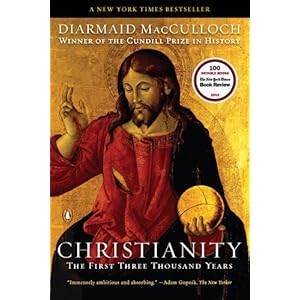 Takeaway: The relationship of the church to the government is important.
Takeaway: The relationship of the church to the government is important.
Purchase Links: Hardback, Paperback, Kindle Edition, Audible.com Audiobook (If purchasing, you want to think about paperback or audiobook. Kindle is the most expensive option at $29.99)
I do not know much about the Eastern Orthodox church. So it is hard to make many educated comments about MacCulloch’s approach to Orthodoxy. But there is a clear theme in his writing on Orthodoxy about the relationship of the church to the government. (That is a clear theme throughout the book with both East and West, but more striking here.)
Much of the history of the Eastern church is wrapped up with governmental structure. Early Eastern church was affected by governmental rule from Constantinople. And at least some of the rejection of Rome as the authority of the church, was about secular governmental reaction to the fall of Rome as the capital of the Empire. Relatively soon after the fall of Rome, Islam rose up throughout the East and within a couple hundred years of the founding of Islam, all of the Eastern church was under Islamic rule with the exception of what became the Russian Orthodox church.
Even the Russian Orthodox church was strongly affected by non-Christian rule because of legacy of the Mongol Empire. While the Russia eventually became predominately Christian, the church had a more decentralized effect on government than Rome had on Europe. The Pope in Rome was often equivalent or even superior to the monarchs of Europe. That level of influence was rare in the Eastern church. For all those that complain that Constantine lead to the downfall of the church, it seems that the Eastern had its own issues even without the same intertwining with government.
One area was a lack of scholarly training and value of the intellect. Much of the East never lost touch with Aristotle and other ancient philosophy, but that contact did not lead to a blossoming of the intellect. Instead a deep suspicion of change and innovation lead to a stagnation that was similar, if not worse than the stagnation that occurred in the West.
The East because of its decentralized leadership had communication issues and splinter groups that, while not necessarily more numerous than in the West, did not have the ecclesiastical structure to deal with disagreement. And the Eastern church was often forced into attachment with government that was unhealthy and did not have any of the corresponding cultural authority for reform that rose up out of the West.
This is definitely an area that I need to spend more time in. This first run through on Eastern church history is most likely leaving me with a lot of misunderstanding. If you have read any Eastern church history books (or theological background books) I would be interested in suggestions.
